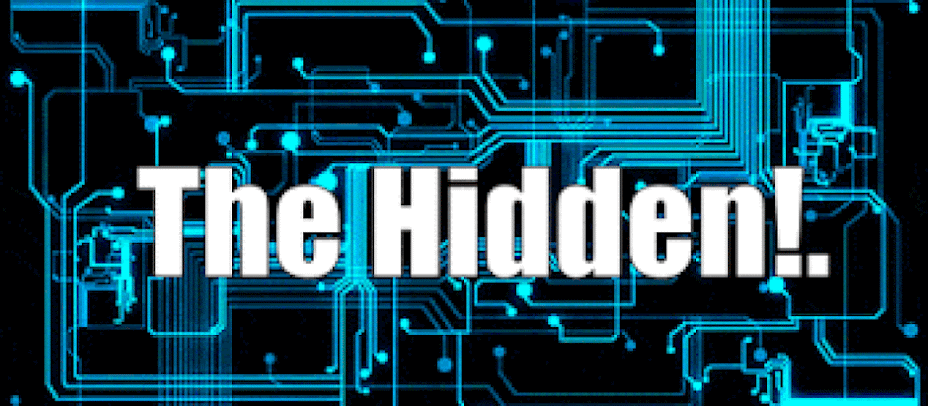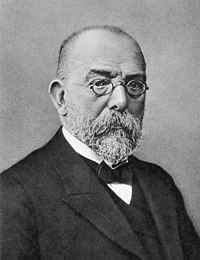Robert Hermann Koch (11 December 1843 – 27 May 1910) was a
German physician who developed Koch's postulates.
[1]
Contents
Koch's postulates of disease.
Koch's postulates are the following:
The microorganism must be found in abundance in all organisms suffering from the disease, but should not be found in healthy organisms.
The microorganism must be isolated from a diseased organism and grown in pure
culture.
The cultured microorganism should cause disease when introduced into a healthy organism.
The microorganism must be reisolated from the inoculated, diseased experimental host and identified as being identical to the original specific causative agent.
The second postulate may also be suspended for certain microorganisms or entities that cannot (at the present time) be grown in pure culture.
[5] Viruses also require host cells to grow and reproduce and therefore cannot be grown in pure cultures.
The third postulate specifies "should" not "must" because, as Koch himself proved in regard to both
tuberculosis and cholera,
[6] not all organisms exposed to an infectious agent will acquire the infection. Noninfection may be due to such factors as general health and proper immune functioning; acquired immunity from previous exposure or vaccination; or genetic immunity, as with the resistance to
malaria conferred by possessing at least one
sickle cell allele.[
citation needed]
There are a few other exceptions to Koch's postulates. A single pathogen can cause several disease conditions. Additionally, a single disease condition can be caused by several different microorganisms. Some pathogens cannot be cultured in the lab, and some pathogens only cause disease in humans.
[7]
In summary, an infectious agent can be considered to be a sufficient cause for a disease if it satisfies Koch's postulates. Failing that, the postulates suggest that the infectious agent is a necessary, but insufficient, cause for a disease.[
citation needed]
Koch's postulates were developed in the 19th century as general guidelines to identify
pathogens that could be isolated with the techniques of the day.
[8] Even in Koch's time, it was recognized that some infectious agents were clearly responsible for disease even though they did not fulfill all of the postulates.
[4][6] Attempts to apply Koch's postulates rigidly to the diagnosis of viral diseases in the late 19th century, at a time when viruses could not be seen or isolated in culture, may have impeded the early development of the field of
virology.
[9][10] Koch's postulates have been recognized as largely obsolete by
epidemiologists since the 1950s,
[11][3] so, while retaining historical importance and continuing to inform the approach to microbiologic diagnosis, they are not routinely used to demonstrate causality.
Koch's postulates have also influenced scientists who examine microbial pathogenesis from a molecular point of view. In 1988, a
molecular version of Koch's postulates was developed to guide the identification of microbial genes encoding
virulence factors.
[12]
That HIV causes AIDS does not follow from Koch's postulates,
[13] which may have supported
HIV/AIDS denialism. The role of
oncoviruses in causing some cancers also does not follow Koch's postulates.
[14]
New discoveries of methods of infections as a result of Koch and many others' work have shown that some diseases and conditions are not always caused by a single microbe species. According to a 2019 study by Todd and Peters, a newly discovered interaction between the pathogen
Staphylococcus aureus and "fungal opportunist"
Candida albicans is being considered a co-infection that is found in the bodies of sick patients who suffer from different conditions. This kind of synergism was found to be lethal in a separate study conducted by Carlson on mice. When mice were infected with one pathogen independently of the other, sickness resulted but the mice were able to recover. When infected with both pathogens together, the mice had a near-100% mortality rate, showing that some pathogens cannot be as easily isolated or may need extra techniques and steps that better prove causation of the disease.
[15]For the 21st century[
edit]
Koch's postulates have played an important role in
microbiology, yet they have major limitations. For example, Koch was well aware in the case of cholera that the causal agent,
Vibrio cholerae, could be found in both sick and healthy people, invalidating his first postulate. Furthermore, viral diseases were not yet discovered when Koch formulated his postulates, and there are many viruses that do not cause illness in all infected individuals, a requirement of the first postulate. Additionally, it was known through experimentation that
Helicobacter pylori caused mild inflammation of the gastric lining when ingested. As evident as the inflammation was, it still did not immediately convince skeptics that H. pylori was associated with
stomach ulcers. Eventually, skeptics were silenced when a newly developed
antibiotic treatment eliminated the bacteria and ultimately cured the disease.
Koch's postulates are also of limited effectiveness when evaluating
biofilms,
Somni cells, and viruses. Cultivation of biofilms requires cultivation by molecular methods rather than traditional methods, and these alternative methods do not detect the cause of infection, which therefore interferes with the third postulate, that microorganisms should cause disease.
[16] For example, Somni cells and viruses cannot be cultured. The Somni cells, also called sleeping cells, become dormant due to strain on the cell. This state of sleep prevents the cell from growing in the culture.
[17] This is similar to how viruses cannot grow in
axenic culture: viruses must be living to replicate, so the culture is not a suitable host.
[18]
Byrd and Segre have proposed changes to the postulates to make them more accurate for today's world. Their revisions involve the third postulate: they disagree that a pathogen will always cause disease. Their first revision involves
colonization resistance. Colonization resistance allows an organism to feed off of the host and protect it from pathogens that would have caused disease if the organism was not attached to the host. Their second revision is that a community of microbes could help inhibit pathogens even further, preventing the pathogen from spreading disease as it is supposed to.
[19] Similar to Byrd and Segre, Rivers suggested revisions to Koch's postulates. He believed that, although the original postulates were made as a guide, they were actually an obstacle. Rivers wanted to show the link between viruses and diseases. Rivers' own postulates are: the virus must be connected to disease consistently; the outcome of experimentation must indicate that the virus is directly responsible for the disease.
[18] Contradictions and occurrences such as these have led many to believe that a fifth postulate may be required. If accepted, this postulate would state that sufficient microbial data should allow scientists to treat, cure, or prevent the particular disease.[
citation needed]
More recently, modern nucleic-acid-based microbial detection methods have made Koch's original postulates even less relevant. These methods enable the identification of microbes that are associated with a disease, but which cannot be cultured. Also, these methods are very sensitive, and can often detect very low levels of viruses in healthy people.[
citation needed]
These new methods have led to revised versions of Koch's postulates. Fredricks and Relman have suggested a set of postulates for the novel field of
microbial pathogenesis.
[18] These modifications are still controversial in that they do not account well for established disease associations, such as
papillomavirus and
cervical cancer, nor do they take into account
prion diseases, which have no nucleic acid sequences of their own.[
citation needed]
^
Jump up to:a b Koch Robert (1884). "2 Die Aetiologie der Tuberkulose". Mitt Kaiser Gesundh. pp. 1–88.
^ Hosainzadegan, Hasan; Rovshan, Khalilov; Gholizadeh, Pourya (12 August 2019). "The necessity to revise Koch's postulates and its application to infectious and non-infectious diseases: a mini-review". European Journal of Clinical Microbiology & Infectious Diseases. 39 (2): 4.
doi:
10.1007/s10096-019-03681-1.
PMID 31440916.
S2CID 201283277.











 #edio
#edio









